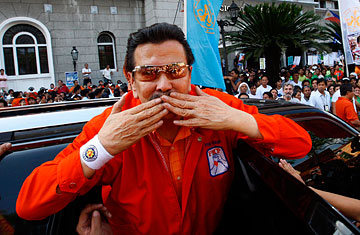
Former Philippine president Joseph Estrada greets his supporters from his limousine after filing his certificate of candidacy for the 2010 presidential race on Nov. 30, 2009
Election season in the Philippines has just begun, and nearly one hundred candidates have registered to run in next year's presidential derby. Eliminate the no-hopers and cranks — one candidate does rooster impressions — and it is shaping up to be a four-cornered race, with a clutch of serious contenders as outside bets.
As things stand, opinion surveys (a far from infallible guide) put senator Benigno "Noynoy" Aquino III in the lead. A low-profile figure during nine years in Congress, the bookish-looking lawmaker was pushed to the limelight just a few months ago after the death of his admired mother Corazon, a former president and symbol of democacy during the anti-Marcos struggle. Some pundits predicted his star would quickly fade, but that hasn't happened. Manuel Villar, a rags-to-riches real estate developer born in Manila's Tondo port area, is placing second. Behind him is ousted former president Joseph "Erap" Estrada. He was convicted on corruption charges in 2007, sentenced to life imprisonment and then pardoned by current President Gloria Macapagal Arroyo. The 72-year-old actor — who is back on the big screen now in a comedy playing a bus driver — still counts the masses as his support base. But it is unlikely that they will vote for him in quite the same numbers as in his win in 1988, and the constitutionality of a former president running again will likely be challenged in the courts.
"It's too simplistic to view Aquino as the clear leader right now; the surveys are far from conclusive and a trend will probably only emerge in January or February," says political science professor Edmund Tayao.
Elections here are high-spending, festive occasions that are good for the economy. But cheating and violence are also par for the course. Commission on Elections director James Jimenez says the debut of electronic voting in 2010 should eliminate two major sources of election crime: trying to fix the outcome by threats of violence again election officials during the vote-counting period, and the practice of dagdag bawas, or padding and shaving votes. "Both should be rendered extinct by an automated vote count in which there will be no opportunity to change the outcome," says Jimenez.
A cynical electorate hopes so. The outrage still brewing over the Nov. 23 election-related massacre on Mindanao echoes the public sentiment felt in during 2007 mid-term polls when three poll watchers were burned alive after armed men torched a school building holding ballot boxes during the manual vote-count.
An elite of moneyed families still dominates the candidates running for Congress and higher local government posts, such as mayors and provincial governors. A parade of celebrities — including boxing champ Manny Pacquiao, running for a congressional seat — are adding the customary glamor. Aquino's sister Kris, a popular television personality, is reported to be energetically rallying her friends in entertainment to publicly support her brother. (Despite his perceived lead, he is not to everyone's taste: one local journalist memorably described him as a "crudely-cut outline of his parents.")
In a highly unusual step, President Arroyo — a hard-working but unloved leader — is running for a congressional seat in her family's home province of Pampanga, which is being specially vacated by her son. Some suspect a dark plot to keep Arroyo in power under a new political system being pushed by her allies. For her part, Arroyo insists public service is "emblazoned in my DNA." The odds are she will win the seat.
Nevertheless, Arroyo's deep unpopularity is seen hurting the chances of her ruling party's presidential bet Gilberto Teodoro, an urbane 43-year-old US-trained lawyer and, according to analysts, a competent former defense secretary. Teodoro's dismal placing in the polls — he trails the top three candidates — may change as he gets more into the public eye. "He offers firm leadership and understands the security situation," says political commentator Alex Magno, who expects security matters will be a prominent election issue. In the intertwined world of this country's dynastic politics, Teodoro and Aquino are related as cousins from different branches of one of the country's wealthiest landowning families. And on paper at least, there could be five Arroyos in the next Congress; there are four in the current one. Even Imelda Marcos, the flamboyant 80-year-old widow of former dictator Ferdinand Marcos, is running for a seat - a further example of the merry-go-round of Philippine politics.
What will their various platforms be? An easier to question, perhaps, is what they should be. Peter Wallace, an Australian business consultant who has lived here for 30 years, says tackling corruption is the "number one" election issue for foreign investors. Over the past years, the Philippines has generally slipped in the rankings of global corruption surveys. And Aquino's bid for the presidency taps a yearning for the honesty in government demonstrated during his mother's terms. To be sure, the economy peaked under Arroyo's leadership, expanding 7.2 per cent in 2007 before being punctured by the global recession. But allegations of vote-rigging in 2004's polls and corruption controversies over government contracts have overshadowed that achievement.
"Filipinos crave a leader whose integrity they can tust," veteran political columnist Amando Doronila wrote in the Philippine Daily Inquirer. "That is the central issue of this election." Says Tayao: "Voters are looking for accountability in the next administration."
